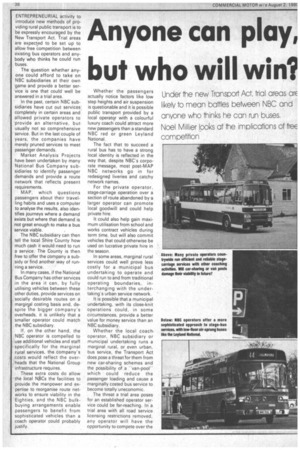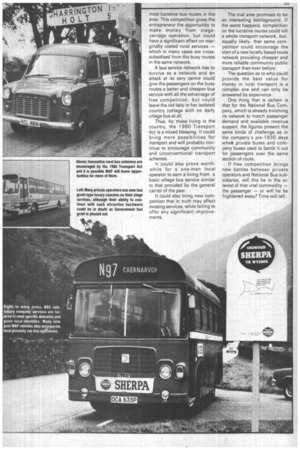Anyone can play, but who will win?
Page 40

Page 41

If you've noticed an error in this article please click here to report it so we can fix it.
ENTREPRENEURIAL activity to introduce new methods of pro viding rural public transport is to be expressly encouraged by the New Transport Act. Trial areas are expected to be set up to allow free competition between existing bus operators and anybody who thinks he could run buses.
The question whether anyone could afford to take on NBC subsidiaries at their own game and provide a better service is one that could well be answered in a trial area.
In the past, certain NBC subsidiaries have cut out services completely in certain areas and allowed private operators to provide an alternative, but usually not so comprehensive service. But in the last couple of years, the companies have merely pruned services to meet passenger demands.
Market Analysis Projects have been undertaken by many National Bus Company subsidiaries to identify passenger demands and provide a route network that reflects present requirements.
MAP, which questions passengers about their travel ling habits and uses a computer to analyse the results, also identifies journeys where a demand exists but where that demand is not great enough .to make a bus service viable.
The NBC subsidiary can then tell the local Shire County how much cash it would need to run a service. The County is then .free to offer the company a subsidy or find another way of running a service.
In many cases, if the National Bus Company has other services in the area it can, by fully utilising vehicles between these other duties, provide services on socially desirable routes on a marginal costing basis and, despite the bigger company's overheads, it is unlikely that a smaller operator could match the NBC subsidiary.
If, on the other hand, the NBC operator is compelled to use additional vehicles and staff specifically for the marginal rural services, the company's costs would reflect the overheads that the National Group infrastructure requires.
These extra costs do allow the local N;BCs the facilities to provide the manpower and ex pertise to reorganise route net works to ensure viability in the Eighties, and the NBC bulk buying arrangements enable passengers to benefit from sophisticated vehicles than a coach operator could probably justify. Whether the passengers actually notice factors like low step heights and air suspension is questionable and it is possible public transport provided by a local operator with a colourful luxury coach could attract more new passengers than a standard NBC red or green Leyland National.
The fact that to succeed a rural bus has to have a strong local identity is reflected in the way that, despite NBC's corporate message, most post-MAP NBC networks go in for redesigned liveries and catchy network names.
For the private operator, stage-carriage operation over a section of route abandoned by.a larger operator can promote local goodwill and could help private hire.
It could also help gain maximum utilisation from school and works contract vehicles during term time, but will also commit vehicles that could otherwise be used on lucrative private hire in the season.
In some areas, marginal rural services could well prove less costly for a municipal bus undertaking to operate and could run to and from traditional operating boundaries, interchanging with the undertaking's urban service network.
It is possible that a municipal undertaking, with its close-knit operations could, in some circumstances, provide a better value for money service than an NBC subsidiary.
Whether the local coach, operator, NBC subsidiary or municipal undertaking runs a marginal rural, or even urban, bus service, the Transport Act does pose a threat for them from new car-sharing schemes and the possibility of a "van-poolwhich could reduce the passenger loading and cause a marginally costed bus service to become totally uneconomic.
The threat a trial area poses for an established operator service could be far-reaching. In a trial area with all road service licensing restrictions removed, any operator will have the opportunity to compete over the most lucrative bus routes in the area. This competition gives the entrepreneur the opportunity to make money from stagecarriage operation, but could have a significant effect on marginally costed rural services — which in many cases are crosssubsidised from the busy routes in the same network.
A bus service network has to survive as a network and an attack at its very centre could' give the passengers on the busy routes a better and cheaper bus service with all the advantage of free competition, but could leave the old lady in her isolated country cottage with no daily village bus at all.
Thus, for those living in the country, the 1 980 Transport Act is a mixed blessing. It could bring more possibilities for transport and will probably continue to encourage community and unconventional transport schemes.
It could also prove worthwhile for a one-man local operator to earn a living from a basic village bus service similar to that provided by the general carrier of the past.
It could also bring new competition that in truth may affect existing services, while failing to offer any significant improvements. The trial area promises to be an interesting battleground. If the worst happens, competition on the lucrative routes could kill a whole transport network, but, equally likely, that same competition could encourage the start of a new locally based route network providing cheaper and more reliable community public transport than ever before.
The question as to who could provide the best value for money in rural transport is a complex one and can only be answered by experience.
One thing that is certain is that for the National Bus Company, which is already trimming its network to match passenger demand and available revenuesupport, the figures present the same kinds of challenge as in the company's pre-1930 days when private buses and company buses used to battle it out for passengers over the same section of route.
If free competition brings new battles between private operators and National Bus subsidiaries, will this be in the interest of that vital commodity — the passenger — or will he be frightened away? Time will tell.




























































































